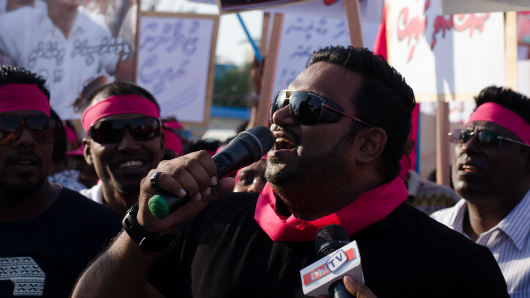Two MPs and 15 councillors of former ruling coalition partner Jumhooree Party joined the Progressive Party of the Maldives (PPM) at an estimated 2,000-strong rally at the Alimas Carnival tonight.
The PPM announced that Kanditheemu MP Mohamed Hussein and Madaveli Muaz Mohamed Rasheed had defected to the party earlier this week, but could not be present at tonight’s rally since they were both out of the country.
The defections come in the wake of JP’s alliance with opposition Maldivian Democratic Party (MDP) against the ruling party’s alleged repeated violations of the constitution.
Speaking to supporters, President Abdulla Yameen called on JP’s remaining 10 MPs to switch parties, claiming they had been elected on a coalition ticket with the majority support from PPM followers.
With the JP’s split from the PPM, “I do not see any legal basis for you to remain with the Jumhooree Party. The majority of your support base is PPM supporters,” he said.
The PPM along with ally Maldivian Development Alliance (MDA) now control 51 seats of the 85-member house. JP and MDP hold 10 and 21 seats, respectively.
President Yameen also appealed to JP Leader Gasim Ibrahim to remember the events of February 7, 2012 in which the JP and PPM allied to oust former President Mohamed Nasheed.
“Gasim Ibrahim, you are our brother, you worked with us in the cabinet, and in various political platforms, and in the People’s Majlis, you were with us on that black February 7. Why don’t you just remind yourself of February 7, 2012? If you only remind yourself of February 7, I do not believe you would do the kind of work you are doing now.”
Yameen also warned Nasheed he would not hesitate to implement a jail sentence, referring to pending charges over the detention of Criminal Court Judge Abdulla Mohamed in January 2012.
“Makes me laugh”
PPM leader and former president of 30 years, Maumoon Abdul Gayoom, said the opposition parties’ alliance in defence of the constitution “makes me laugh.”
“Those who stand up in defence of the constitution must first respect the constitution and uphold its tenets. Otherwise, it is just nonsense. How can those who violate the constitution defend the constitution?” he asked.
Gayoom described the allied parties’ call for the overthrow of President Yameen’s administration through street protests as illegal.
“The constitution does not recognise the overthrowing of a government,” he said.
At tonight’s rally, PPM supporters ridiculed Gasim, broadcasting an animated video in which a crocodile accused the tourism tycoon of failing to pay taxes and rent owed to the government.
Tourism Minister Ahmed Adeeb has previously claimed Gasim owed the state US$100 million, a claim Gasim has subsequently denied.
Earlier this month, Adeeb annulled lease agreements of three uninhibited islands and three lagoons reportedly given to Gasim’s Villa Group under a settlement agreement when Kaadehdhoo Airport and several uninhibited islands were taken from the company and nationalised.
The matter is being contested at the Civil Court.
Gasim’s backing was crucial for Yameen’s narrow presidential win in November 2013. In a re-run of the first round of polling, Yameen won 29 percent, Gasim 23 percent and Nasheed 46.9 percent.
The PPM and JP allied, contested January’s local council elections and March’s parliamentary polls after divvying up the seats between them on a pre-arranged percentages. The coalition fractured with the PPM’s refusal to support Gasim’s bid for Majlis Speakership in May 2013.
Despite declaring a split from the PPM then, the JP continued to support the government’s legislative agenda, backing the controversial Special Economic Zone Act after the government downgraded Gasim’s Villa Group’s International Airport on Maamigili Island and terminated a contract with Villa on managing Kaadedhoo airport.
When JP backed the SEZ bill, the government reversed both decisions.
The allied opposition parties have accused the PPM government of authoritarianism, harassing political rivals and repeatedly violating the constitution by unlawfully dismissing the Auditor General and two Supreme Court judges.
Yameen’s former Defense Minister Mohamed Nazim is currently in police custody on charges of treason and terrorism.
The PPM rally follows a march this evening in which hundreds of young men marched in support of President Yameen.
Supporters of the MDP and JP continued their nightly protests tonight in front of the Maldives Monetary Authority (MMA).
Photo courtesy of @asurumaa
Related to this story
Hundreds march in support of President Yameen
Nasheed defends coalition with former rivals
Opposition street demonstrations head into third consecutive night
Opposition alliance a “waste of time”, says Gayoom
Gasim defiant as opposition sign agreement to defend Constitution

